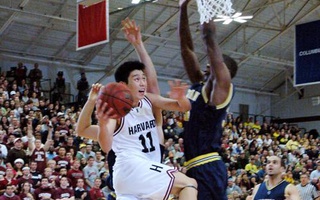Activists amped up their efforts late spring semester, calling for greater transparency in Harvard’s investment strategy from HMC. Responsible Investment founded the Fair Harvard Fund, a campaign for a social choice fund within Harvard’s endowment that would be invested with an eye toward social good. The Undergraduate Council endorsed the initiative, and within 10 weeks of its creation over 400 people had donated to the cause.
During the fall, students turned their attention to individual investments within Harvard’s portfolio. Divest Harvard, Harvard’s chapter of Students For a Just and Stable Future, called for HMC to divest from companies involved in the fossil fuel industry. That effort, coupled with continued calls for Harvard to create a social choice fund, resulted in two successful student referenda related to the University’s investment strategy.
Student activists celebrated the University’s decision in December to create a social choice fund. Contributions to the fund will be invested with an eye towards “social responsibility considerations.” But the fight over divestment remains stalled, as students continue to advocate for changes to the University’s investment strategy after Harvard said that it is is “not considering” divestment. Even so, University leaders have promised to meet with students in the new year to discuss divestment, ensuring that the conversation about Harvard’s investment strategy will continue.
4. Men’s Basketball Goes to March Madness
After a 66-year drought, the Harvard men's basketball team returned to college basketball's biggest stage. The Crimson claimed its first-ever outright Ivy title and in doing so earned a berth in the NCAA tournament for the first time since 1946.
Boasting a 26-4 overall record, the Crimson was tabbed a No. 12 seed and was slotted to face No. 5 Vanderbilt—which was coming off a victory over No. 1 Kentucky in the SEC Championship—in Albuquerque, N.M. In front of a contingent of Harvard fans that included a member of the Crimson's 1946 squad and the Harvard University Band, the Crimson met the Commodores on March 15.
Harvard came out slow, falling behind by double-digits by the end of the first period. But carried by the hot shooting of then-sophomore wing Laurent Rivard—who finished with a team-high 20 points—the Crimson managed to pull within five, 70-65, with 1:51 to go. It was all Vanderbilt from there, as the Commodores closed the game on a 9-5 run to secure a 79-70 victory, ending Harvard’s storybook season.
Although a postseason victory remained elusive, the Crimson’s appearance in the tournament cemented its rise as a force to be reckoned with after decades of mediocrity on the basketball court.
3. Elizabeth Warren Is Elected to the Senate
Just days after declaring her candidacy for the U.S. Senate in September 2011, Harvard Law School professor Elizabeth Warren assured a crowd of supporters that "there's nobody in this country who got rich on his own." That comment, which went viral on YouTube and polarized much of the Massachusetts electorate, set the stage for one of the country's fiercest and most expensive U.S. Senate races in recent history—a race that pulled Harvard into the political spotlight.
Warren and incumbent Republican Scott Brown dueled over everything from taxes, to third-party advertising, to Warren's self-proclaimed Native American heritage, which Brown alleged was little more than a lie. Warren ascended as a national liberal cause célèbre, speaking at the Democratic National Convention and demonstrating close ties to President Obama. The candidates combined to shatter state fundraising records, together bringing in over $70 million. Closer to home, Warren found robust financial and intellectual support from Harvard colleagues, who time and time again stepped up to bat for her campaign.
Beneath the surface of each battle on the campaign trail lay stark differences between the candidates’ fiscal and social stances, with Warren pledging bigger government and a tighter tax code and Brown promising a return to bipartisanship. Brown, a moderate Republican with widespread support at home, was vying for the nearly impossible: reelection in one of the bluest states in the country. But ultimately it was Warren, a leader of the intellectual left and longtime consumer advocate, who successfully transitioned from professor to politician to become the first woman ever elected to the U.S. Senate from Massachusetts.
Read more in News
Harvard Braces for Decline in Federal FundingRecommended Articles
-
 Crimson Ties Program Record With 19th Win
Crimson Ties Program Record With 19th Win -
Institutionalizing QueerTen years ago, in response to student activism, Harvard created the Office of Sexual Assault Prevention and Response. Three years later, after student demands, it inaugurated the modern Harvard College Women’s Center. Most recently, just two years ago, Harvard funded the Office of BGLTQ Student Life, also in response to organized student outcry
-
Queer Advisory Council Funds New ProjectsAs part of a new initiative to provide funding directly for BGLTQ-related events on campus, the Queer Advisory Council made public on Feb. 28 the list of 12 campus activities that will be receiving grants this spring cycle.
-
 Summers Warns Against Appearance of Anti-Israel Bias at Harvard
Summers Warns Against Appearance of Anti-Israel Bias at Harvard -
 Remembering Where He Came From: Five Minutes with Jeremy Lin
Remembering Where He Came From: Five Minutes with Jeremy Lin -
 Remembering Where He Came From: Five Minutes with Jeremy Lin
Remembering Where He Came From: Five Minutes with Jeremy Lin













